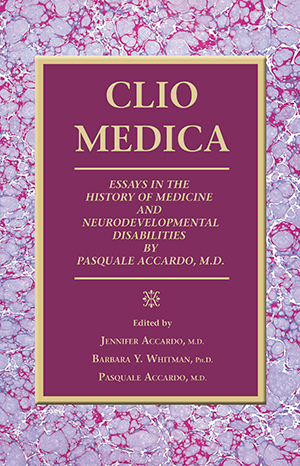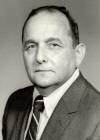



Pasquale Accardo graduated from St. John’s University magna cum laude, received his M.D. from SUNY Downstate, served a tour of duty in the USAF, completed his pediatric residency at Riley Hospital for Children in Indianapolis, and his child development fellowship at the John F. Kennedy Institute, Johns Hopkins, in Baltimore. He is specialized in Pediatrics with subspecialty certifications in Neurodevelopmental Disabilities and Developmental and Behavioral Pediatrics through the American Board of Pediatrics (ABP). He previously served as the medical director of the Knights of Columbus Developmental Center at St. Louis University School of Medicine, and as LEND director of the Westchester Institute for Human Development, New York Medical College, Valhalla. He is currently the James H. Franklin Professor of Developmental Pediatrics at Virginia Commonwealth University, the Medical College of Virginia, and medical director of the Children’s Hospital of Richmond Child Development Clinic. Past appointments include President of the Society for Developmental Pediatrics, first chairman of the Section on Children with Disabilities of the American Academy of Pediatrics (AAP), and member of the American Board of Pediatrics. Dr. Accardo has authored numerous publications on child development, Sherlock Holmes, and G.K. Chesterton. He is a recipient of the Arnold J. Capute Award from the AAP Council on Children with Disabilities, the Lifetime Achievement Award from the American Chesterton Society and is invested in the Baker Street Irregulars as Gorgiano of the Red Circle. He has been married to the beautiful Patricia for forty seven years and has three children: Jennifer (a physician), Matthew (a lawyer), and Claire (an artist).
Jennifer Accardo graduated from St. John’s College, Annapolis, MD, and earned her M.D. from St. Louis University School of Medicine. She did her pediatric residency at Cook County Children’s Hospital in Chicago followed by neurodevelopmental disabilities training at the Kennedy Krieger Institute in Baltimore, which she joined as one of the last classes welcomed by Arnold Capute. She completed a fellowship in sleep medicine at the Children’s Hospital of Philadelphia and University of Pennsylvania, where she also earned a Masters in Clinical Epidemiology. She is board certified in Pediatrics and Neurology with Special Qualification in Child Neurology and Sleep Medicine. She founded and directs the Sleep Disorders Clinic at the Kennedy Krieger Institute, where she is on faculty, and has her academic appointment as an Assistant Professor of Neurology and Pediatrics at the Johns Hopkins University School of Medicine. She lives with husband Dwight Swanson and daughter Frances in Baltimore City.
Barbara Y. Whitman received both a Master’s in Social Work and a Ph.D. from Washington University in St. Louis. Currently she is a Professor of Pediatrics at St Louis University School of Medicine, where she, along with Dr. Accardo founded the Knights of Columbus Development Center. Currently, Dr. Whitman maintains a practice with children who have developmental concerns and their families. In addition, Dr. Whitman’s initial research in Prader-Willi syndrome (PWS) included defining and managing behavioral components of the syndrome. Dr. Whitman and her colleagues conducted the first controlled research in the US regarding the impact of growth hormone replacement therapy in this population resulting in an FDA indication for this therapy. A corollary to this work has been the intersection of research in autistic spectrum disorders and attention disorders as they co-occur in individuals with PWS. Dr. Whitman was the first to describe ADHD in persons with Prader-Willi syndrome and the first in the USA to conduct systematic investigation into the incidence of autistic spectrum disorders in this population. In addition to several books co-authored with Dr. Accardo, she recently served as senior editor for The Management of Prader-Willi Syndrome: Third Edition. Her current research involves a laboratory approach to discovering the cause of the hyperphagia in PWS.
Preface by Jennifer Accardo and Barbara Y. Whitman
"Art is I, science is we," wrote French physicist Claude Bernard. If this epigraph holds true, medical history conciliates the line between art and science. The monolith of the "medical literature" collective that (purposely) erases personality becomes enlivened and animated by glimpses into the colorful lives of the characters constructing that monolith. To that end, Pasquale Accardo proposes that history is individual biography; from this perspective, the focus is on persons rather than "movements." This collection of essays, like the proverbial box of chocolates, is surprising: you never know what (or who) you might get. Further, these essays view medical history through the prism of the author himself, with his catholic (both large and small C) tastes and varied, often lifelong obsessions.
Pasquale Accardo has crafted his life’s work in neurodevelopmental pediatrics, a medical specialty devoted to the care of children with developmental disabilities. This field of diverse diagnoses is unified by the underlying chronic physical, behavioral and cognitive challenges attendant to those affected. The author’s passion for the field and for the "colorful persons" whose individual biographies form its history is evident throughout the book. A special highlight herein are the chapters on neurodevelopmental pioneer Arnold Capute, Accardo’s charismatic mentor, which portray a trickster god one might have been accused of inventing had he not leaped fully formed into the halls of Johns Hopkins. Detailed interest in the rhetoric of the "aphorisms" is apparent in Accardo’s edition of Shakespeare’s A Midsummer Night’s Dream (2013).
While the epigrams of Hopkins’ Capute may survive primarily in the memory of his cadre of trainees and in these pages, William Osler left medicine a more extant legacy of philosophic writings. Osler’s recommendations on reading exerted a significant influence on the author and are still considered worth investigating.
Further, gravity and levity need not be opposites as the obvious is turned topsy-turvy. Sigmund Freud, an iconic psychiatrist whose unproven theories of the origin and treatment of the human psyche held sway for decades, is revealed as a neurologist of uncommon common sense regarding the origins of cerebral palsy. Few realize that had he not gone into psychoanalysis, Freud would still have occupied a notable place in the history of neurology because of his pioneering work in CP. The papers on Freud and William John Little were originally parts of a book described by the author as much overwritten on the history of cerebral palsy, subsequently dissected into the several journal papers reprinted in this volume.
Bruno Bettelheim, on the contrary, is shown as a charlatan, perpetuating decades of damage in the world of autism even while portraying himself as the beneficent healer. Psychoanalysis was the accepted way of approaching mental illness through the 1970s. It is difficult to imagine how quickly this dogma collapsed – as well as how slow some were to accept its collapse. Accardo notes this was not dissimilar to the fall of that other infamous twentieth century belief system—Communism. By ignoring the clear indications of neurodevelopmental dysfunction as the etiology of autism spectrum disorders, while at the same time perverting psychoanalytic theories and treatment methods, Bettelheim was a prime mover in the collapse of psychoanalytic methods as the primary driver of psychiatric treatment.
Postmortem diagnoses often reduce the angst of formerly great men by exposing the pathologic clockworks that presumably made them tick. By contrast, Accardo’s discussion of G.K. Chesterston’s attention-deficit/hyperactivity disorder uses the man to elevate the diagnosis, thus refocusing on the energy and grand sweep of the condition. Ironically, after Accardo published extensively on Chesterton’s detective Father Brown (4 volumes), his book illustrations, and his poetry (The Christian Epic of Freedom: A Commentary on G.K. Chesterton’s Ballad of the White Horse, 2015), the reception given to his paper on the neuropsychology of his favorite author was received very negatively and considered as almost an insult.
Accardo started reading Dante while still in high school and never quite stopped. We can attest to his bookcases of texts, translations, commentaries and background material. He styles himself a medievalist with regard to both history and philosophy. Resourcefully, he managed to integrate several of his obsessions into The Infernal Holmes: Dante in Baker Street: Being Essays on the Influence of Dante’s Inferno on the Detective Fiction of Sir Arthur Conan Doyle (Shelburne, Ontario: The Battered Silicon Dispatch Box, 1999), "Vermissa PA – Inferno USA" in S.T. Doyle (editor) Murderland: A Companion Volume to the Baker Street Irregulars’ Expedition to the Valley of Fear (New York: Baker Street Irregulars, 2004), pp. 45-48. He threatens a prose (novel) version of the Divine Comedy when he retires.
This Baker Street Irregular is a Sherlockian of highest order. The first of his 8 books on Sherlock Holmes detailed the relationship between Holmes and Medicine, Diagnosis and Detection: The Medical Iconography of Sherlock Holmes (Rutherford, New Jersey: Fairleigh Dickinson University Press, 1987). This medical aspect continues into his most recent Sherlockian contribution "Watson’s Medical Practice" (Pasquale Accardo and Jennifer Accardo), in Robert Katz and Andrew Solberg (editors) Sherlock Holmes and Medicine (New York: The Baker Street Irregulars, in press).
Some of these essays were published elsewhere in the form contained within. A few were rewritten in their entirety. Some were originally presented as talks to conclude an annual conference, The Spectrum of Developmental Disabilities. As epilogues to the conference, their aim was either to pull together strands of discussion from the conference proceedings, or more likely, to ignore the conference altogether in service of delighting and occasionally horrifying the attending medical audience. Occasional errors are likely and acknowledged here: Recent archeological findings don’t agree with the medical diagnosis in the chapter on Richard III, but do not substantially detract from the lesson that Little attempted to draw from Shakespeare’s portrait. Also, when the paper on Steno was first presented, it was mistakenly thought that Steno had already been canonized. As of this writing, actually he remains a Blessed and so is not yet a Santa Claus. Perhaps Pope Frances will remedy this prior to future editions.
Please raise a glass with us to medical history and enjoy the wisdom and whimsy within.
Other Books by the Same Author: